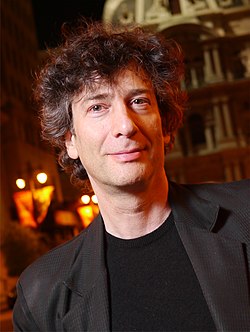Neil Gaiman Quote
I don't think immediate tragedy is a very good source of art. It can be, but too often it's raw and painful and un-dealt-with. Sometimes art can be a really good escape from the intolerable, and a good place to go when things are bad, but that doesn't mean you have to write directly about the bad thing; sometimes you need to let time pass, and allow the thing that hurts to get covered with layers, and then you take it out, like a pearl, and you make art out of it.When my father died, on the plane from his funeral in the UK back to New York, still in shock, I got out my notebook and wrote a script. It was a good place to go, the place that script was, and I went there so deeply and so far that when we landed Maddy had to tap me on the arm to remind me that I had to get off the plane now. (She says I looked up at her, puzzled, and said "But I want to find out what happens next.") It was where I went and what I did to cope, and I was amazed, some weeks later when I pulled out that notebook to start typing, to find that I'd written pretty much the entire script in that six hour journey.
I don't think immediate tragedy is a very good source of art. It can be, but too often it's raw and painful and un-dealt-with. Sometimes art can be a really good escape from the intolerable, and a good place to go when things are bad, but that doesn't mean you have to write directly about the bad thing; sometimes you need to let time pass, and allow the thing that hurts to get covered with layers, and then you take it out, like a pearl, and you make art out of it.When my father died, on the plane from his funeral in the UK back to New York, still in shock, I got out my notebook and wrote a script. It was a good place to go, the place that script was, and I went there so deeply and so far that when we landed Maddy had to tap me on the arm to remind me that I had to get off the plane now. (She says I looked up at her, puzzled, and said "But I want to find out what happens next.") It was where I went and what I did to cope, and I was amazed, some weeks later when I pulled out that notebook to start typing, to find that I'd written pretty much the entire script in that six hour journey.
Related Quotes
About Neil Gaiman
Gaiman's awards include Hugo, Nebula, and Bram Stoker awards and Newbery and Carnegie medals. He is the first author to win the Newbery and the Carnegie medals for the same work, The Graveyard Book. The Ocean at the End of the Lane was voted Book of the Year in the British National Book Awards, and it was adapted into an acclaimed stage play at the Royal National Theatre in London.
Beginning in 2024, news outlets published sexual assault accusations against Gaiman by numerous women. This affected or halted production on several adaptations of his work. One accuser sued Gaiman and his estranged wife Amanda Palmer for rape and human trafficking. Gaiman has denied these allegations.
